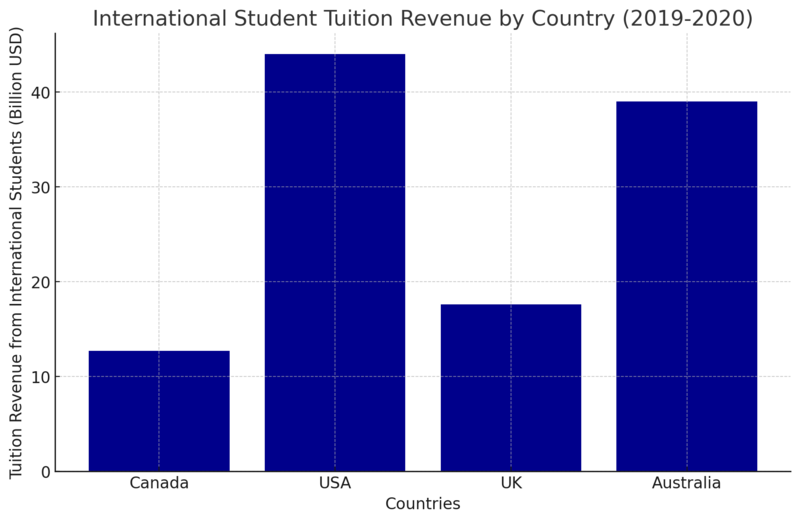Students have been sold a dream by agents and universities
Input
Modified
Many countries have implemented policies to attract international students for their financial and intellectual contributions, as international education has become a propelling force in global mobility and economic strategy. This has resulted in the emergence of exploitative recruitment agencies and fraudulent institutions that exploit the demand for overseas education, despite the fact that it presents valuable opportunities for both students and host nations. Although legitimate agencies offer crucial assistance in traversing intricate visa and enrollment procedures, unethical actors deceive students by making false claims about guaranteed visas, employment, and residency. This absence of supervision not only compromises the credibility of educational institutions but also positions international students in precarious emotional and financial circumstances. To guarantee that students are afforded the opportunities they desire, and that international education maintains its integrity, it is imperative to establish more stringent regulations, enhance institutional accountability, and establish comprehensive support systems. International education is at risk of becoming more of an immigration loophole than a pathway to genuine academic and professional development in the absence of these measures.

Countries such as the United States, Canada, Australia, and the United Kingdom are actively competing for international students, primarily due to the economic benefits. In order to compensate for diminished public funding, universities and colleges significantly depend on tuition from foreign students. In 2019-2020, tuition fees from international students in Canada generated an estimated $12.7 billion. An inundation of recruitment agencies has resulted from this financial incentive, which is exploiting students' urge to migrate. According to a 2021 audit report, approximately 280,000 international students were enrolled in Ontario, accounting for 68% of college tuition revenue. These institutions are susceptible to market fluctuations, visa policy modifications, and recruitment fraud due to their financial dependence on foreign students. Studying abroad is not merely an academic endeavor for numerous international students; it is also a means of obtaining employment and residency. For instance, Canada's immigration system offers graduates of Canadian institutions the opportunity to earn additional points when applying for permanent residency. Nevertheless, this system has resulted in agents who deceive students into believing that enrollment in particular institutions guarantee immigration.

Immigration agencies are essential in assisting students and laborers in navigating the intricate visa and settlement processes. They provide support in the areas of language requirements, documentation, and enrollment in educational institutions. Unfortunately, some agencies have engaged in deceptive practices, making false promises regarding visas, employment, and permanent residency. Concerns regarding fraudulent immigration agencies that fail to fulfill their obligations are underscored in a Quora thread. The majority of contributors concur that these actions are fraudulent and emphasize the importance of conducting thorough research prior to utilizing these services. The importance of appropriate supervision and regulation is underscored by the numerous individuals who have experienced fraud.
A substantial scandal has recently surfaced in Los Angeles, where the administrators of four schools were apprehended for operating a "pay-to-stay" scheme that enabled foreign nationals to maintain their student visa status without attending classes. The fraudulent institutions permitted students to remain in the United States without satisfying academic requirements by accepting tuition payments in exchange for Form I-20s. Three individuals were indicted for money laundering and immigration fraud, with a single school alone generating nearly $6 million annually from such schemes. This case demonstrates the potential for systemic abuse to result from inadequate governance, which can compromise the integrity of immigration and educational standards. In India and China, pupil recruitment malpractices have been identified through investigations. Billboards and advertisements in Punjab, India, advertise studying in Canada as a guaranteed route to permanent residency. Some agencies deceive families into selling assets to finance their children's overseas education by promising high-paying employment beyond graduation. Furthermore, it is purported that certain recruiters pay commissions to secure student placements, which frequently results in the exaggeration of application numbers. This has resulted in institutions prioritizing revenue over educational quality, resulting in admission offices that are overcrowded and academic standards that are diluted.
Many students who arrive under false pretenses are unable to fulfill academic obligations because of language barriers and employment responsibilities. Some individuals lack the requisite skills for higher education, despite successfully passing language proficiency examinations. Educators' reports indicate that the quality of education is compromised to facilitate students who are not adequately prepared. Additionally, students who anticipate lucrative employment opportunities frequently discover themselves employed in low-wage industries to maintain their financial stability. These students are exploited by businesses as cheap labor, while financial hardship compels them to pursue additional employment illegally. The high cost of living in Brampton, Ontario has resulted in a significant number of international students residing in illicit, overcrowded housing. In 2019, the city received 1,600 complaints concerning secondary housing units that were not regulated. The financial ruin that families who invested heavily in education-abroad dreams confront is a topic that is frequently discussed on Punjabi-language radio, with many callers emphasizing the issue. International students endure an immense mental health burden. A Toronto funeral home director has reported that they are responsible for the care of four to five international students' fatalities each month, which are believed to be the result of suicides or overdoses.

The challenges that students encounter have been largely disregarded by authorities, despite the fact that immigration agencies and educational institutions benefit from the system. Policy recommendations include the decoupling of education from immigration to ensure that admission to colleges is not a guaranteed pathway to residency. Rather, international graduates should be assessed in conjunction with other immigration applicants. To prevent fraudulent recruitment, immigration and education agents should be subject to more stringent licensing requirements and oversight. Regular academic audits can be implemented to guarantee that students remain enrolled full-time and attend legitimate institutions. To mitigate their dependence on international tuition, universities and colleges should receive sufficient government funding. Additionally, to guarantee the success of international students, universities must offer enhanced academic, employment, and mental health support.
The intersection of international education and immigration presents both opportunities and challenges. While students strive for academic and professional development, their aspirations are endangered by unethical recruitment practices and fraudulent institutions. To preserve the integrity of both the education and immigration systems, governments must establish a balance between economic benefits. The prioritization of transparency, ethical recruitment, and meaningful student support is essential for a fair and sustainable immigration policy. International education can only then fulfill its genuine purpose of promoting global knowledge exchange, rather than serving as a trivial entryway for migration.





















